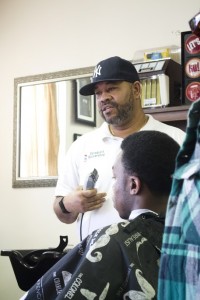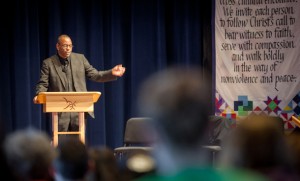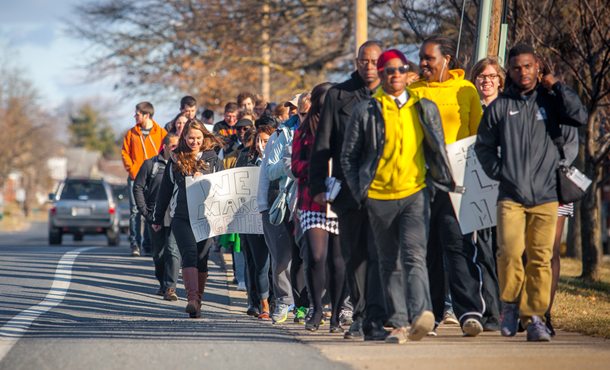What creates systems of discrimination and oppression? What power and motivation do people have to resist these systems? Where do they take comfort when hatred acts? These questions were asked during the Jan. 15-20 Martin Luther King Jr. celebration hosted by Eastern Mennonite University. Activities included lectures, chapel meetings and talkbacks; reading circles and discussions of King’s speeches and published works; and local service opportunities.
An annual and favorite tradition among the EMU community is a trip to Sprague’s Barbershop in downtown Harrisonburg, where Tyrone Sprague gives haircuts along with lively conversation on the sixth floor of a Court Square building. Sunlight streamed in through lacy beige curtains as a group of EMU students filed in to learn and discuss the history of racism in Harrisonburg.
“America’s original sin is that America was established as a white society,” with slavery being a key foundation of the nation, said visit facilitator Stan Maclin, vice president of the Northeast Neighborhood Association, a community group working to keep that area of Harrisonburg clean, safe, and crime-free.

In the 1950s and 60s, the northeast corner of Harrisonburg – where Rose’s and Autozone are now – was a bustling neighborhood of black culture and business. Then came Project R4. Cities across the country were given the opportunity to receive development funds for “urban renewal” projects in areas labeled as slums. Harrisonburg’s black neighborhood was declared eminent domain, residents were displaced, and their land sold to commercial developers.
Maclin cited King’s “Beyond Vietnam” address in response to structural racism such as Project R4: “I am convinced,” King wrote, “that if we are to get on the right side of the world revolution, we as a nation must undergo a radical revolution of values.”
Sprague, giving a haircut during the visit, said that he sees this “revolution of values” happening in younger generations. Across different ethnicities, “they eat together, they laugh together, they go dancing together. In the 1960s and 70s, you didn’t see that,” said Sprague, who grew up in Farmville, Virginia. Sprague remembers that his mother – and white culture – taught him to fear repercussions for looking a white woman in the eyes if he passed her on the street.
The celebration also brought visitors to the EMU campus and the local community, including The Rev. Dr. Nikita Okembe-Ra Imani, a prominent poet, hip-hop artist, musician, and black history scholar from the University of Nebraska at Omaha. Speaking at Bethel African Methodist Episcopal Church during a Sunday service, Imani credited King’s confidence in the face of such ingrained mistrust to his faith in God. When we see “mayhem and destruction, the kind of sickness without compassion,” said Imani, “the world is calling for the people of confidence.” King’s ideology and strategies were direct results of his pacifistic Christianity, Imani explained. “The system had tanks. The system had batons … the system had financial power. King had the Word.”

At the next day’s MLK Day chapel service, Imani called all Christians to join together. Cultures of violence, he said, are ultimately impotent before Christians, who “bring power and brotherhood where there is hatred and malevolence.”
Accompanying Imani to Bethel AME and also during the on-campus MLK Day service was the EMU gospel choir and newly installed Harrisonburg mayor Chris Jones.
Jones, president of the local chapter of the National Association for the Advancement of Colored People (NAACP), led an afternoon community program at Lucy Simms Center (formerly Lucy Simms School, this segregated school taught area black children from 1939-1966).
The program included two songs by the MLK Celebration Choir. EMU members of this community group included campus chaplain Brian Martin Burkholder, cross-cultural program assistant Linda Martin Burkholder, and Celeste Thomas, of multicultural student services.
Thomas co-chaired the MLK Celebration planning committee with student Christian Parks. The committee wanted to “create a celebration of the life of Martin Luther King Jr. by concentrating on who he was as a person as well as what he did for our country,” she said.
“The hope is that King’s vision and dream can inspire more dreams and more efforts,” said Parks. “In the gathered beloved community, I believe we can dream an America that truly finds the beauty in all things.”
